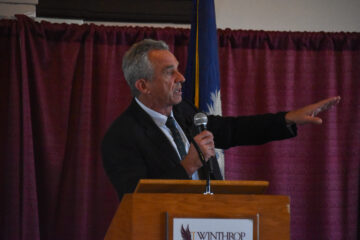Very soon after leaders and pharmaceutical companies began to speak of developing a vaccine against COVID-19, rumors about the yet-to-be–developed formula exploded across the internet. Yet, why are so many people against vaccines, and is this a medical issue or a political one?
By the 18th century, inoculations had a long history with India and China but were yet to be successfully used in North America or England. This changed in 1721 during the smallpox epidemic, when news of initial successes in Massachusetts spread across the British empire. Although many parents inoculated their children as a precautionary measure, it was not until nearly two centuries later that smallpox all but disappeared.
In the first stages of inoculation, without advanced knowledge of disease or having yet engineered the hypodermic needle, people used variolation. With this method, the doctor would open a wound and insert freshly gathered pus from a smallpox victim’s sores.
At the end of the 18th century, variolations began to be replaced with vaccinations, using an analogous disease from cows that was soon administered via injection.
Just one year after the first Western inoculations, religious arguments against the practice began to circulate. These arguments—mostly circulated in church sermons—declared that disease was a tool of the Christian God, and efforts to prevent it was ‘a diabolical operation.’
When variolation began to be replaced with vaccination, some resistance came from genuine safety concerns, but the vast majority came from a lack of understanding.
As both diseases and comprehension of them continued to advance through the years, scientists attempted using vaccinations as protection against diphtheria, tuberculosis, polio, and, most recently, COVID-19.
This practice has provided a firewall for the general population, at the cost of serious complications, usually resulting from either human error or simply absence of knowledge.
Some of the most heated arguments for and against vaccinations arose as a result of the polio epidemic. In weighing the benefits, polio devastated its victims—it left many of them partially or completely paralyzed—but continuous vaccinations succeeded in largely eradicating it.
However, in 1955, Cutter Laboratories accidentally produced 120,000 vaccine doses that contained live poliovirus and caused a small outbreak in its own right, serving as a reminder that in the field of epidemiology, small mistakes can have massive consequences.
Today, most arguments against vaccination fall into one of two categories: either sourced from genuine concern for medical or physical safety or based on religious or political beliefs. In general, vaccinations do carry some degree of medical risk, but it is very rare for any of the adverse reactions that happen to verify any of the predictions.
The primary reason that most believed dangers are not investigated by the scientific community is that only a very small number of them have ever been published in a reputable, peer-reviewed journal or site.
One of the few cases happened in 1998 when Andrew Wakefield and 11 other authors published a paper claiming that the MMR vaccine causes autism. Although 10 of the other authors formally retracted their claims and Wakefield was proved to have deliberately falsified information, theories that vaccines and autism are linked continue to prevail.
Conspiracy theories as a whole have continued to put fuel on the fire. Many claims have arisen that recent vaccines, including the COVID-19 vaccine, contain microchips, nanobots or mind-controlling chemicals, to name a few examples.
During 2020, accusations flew abound that wealthy or influential people, such as Bill Gates, who were backing the vaccine were hoping to achieve some unspecified plan of world domination.
Although some organizations in America, such as schools and workplaces, are allowed to prohibit entrance to people who have not been vaccinated, there is no law that forces all citizens to be vaccinated, regardless of consent. Anti-vaccination believers may suffer certain disadvantages, but they still have the full choice on whether to receive vaccinations or not.
Anti-vaxxers do cause a certain degree of danger to the public on their own, but the real danger comes in the way that they have made the issue political themselves. The doubt and fear they spread through disinformation, and the legislature providing vaccinations to other groups that they have fought against, have forced vaccinations to be a political issue.
In order to succeed, the American people need to take a stand against misinformation, regardless of which side it is on. Pro-vaxxers and anti-vaxxers alike hold a duty to only use credible information in formulating their claims if they want to inform others on their cause. In a way, their beliefs may be putting other people’s lives at a huge risk, and all for a small jab.
Photo by Emma Crouch




